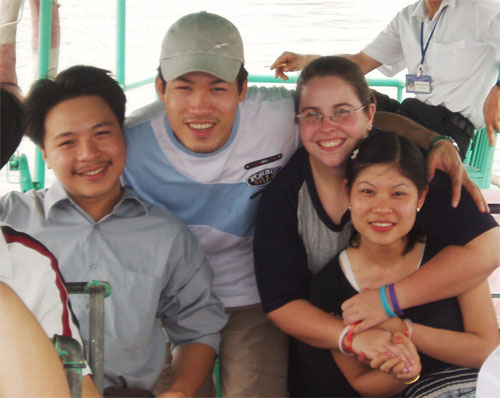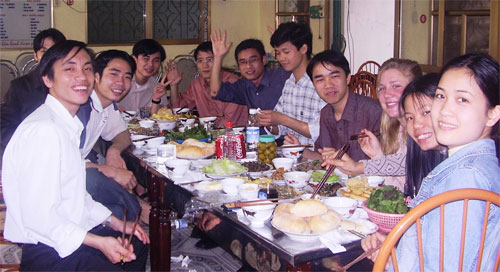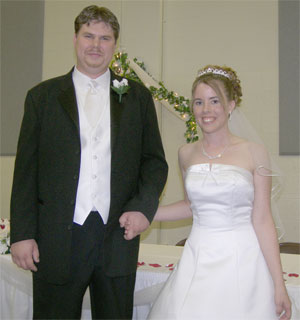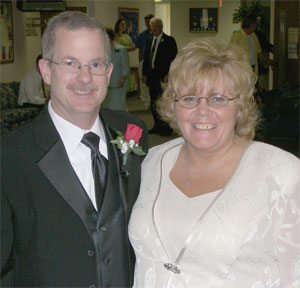One of the great surprises of my life is that my country has become a champion of state-sponsored torture. I know my wording makes you grimace. But the USA is a world state, we do commit or allow torture (while denying it), and our top leaders oppose legal restrictions on torture, so what can I say? Our wimpy allies in other Western nations are disturbed and dismayed, failing to see the redeeming qualities of torture, a practice with a long and distinguished history. I’m proud to belong to a country unafraid to buck world opinion and do what it feels is right.
But at the same time, I’m having bouts of guilt, inexplicable difficulty accepting the obvious merits of torturing foreigners. As much as I fight these impulses, desperately trying to follow the moral leadership of Cheney and Rummy, I find myself too often succumbing to feelings which can only be described as those of a bleeding-heart, raghead-loving, weak-kneed, misguided moralist. So many of our great religious figures, like Jerry Falwell and Tom Delay, fully support the application of torture. And where are the Christian voices speaking out against torture? Nada. My misgivings obviously betray a faulty conscience.
I remember a quote from one military officer who said, “After 9/11 we opened the door to a little torture, and a whole lot of torture walked through.”
To defend torture, people always trot out the “burning fuse” argument: if a nuclear bomb will explode in an hour and a guy definitely knows where it’s located, shouldn’t you be able to torture the information out of him? My response: yes. On that I agree with Cheney et al.
But this is an extreme scenario which, as far as I know (and what do I know?), hasn’t occurred. Yet we’ve tortured a lot of people, and create secret prisons in other countries to facilitate it. Are all of these people sheltering atomic bombs? Well, no. We are torturing for lesser reasons, sometimes just going on fishing expeditions to see if the poor bloke does, indeed, know something useful, which the interrogator discovers upon finding the proper mixture of question and electrical stimuli. If we only tortured people when there was an imminent threat, hundreds of shadowy CIA patriots would be out of work. They need to ply their trade, to keep in practice for when a true burning fuse situation arises. And so they round up hapless Iraqis and Talibanis who might know something about somebody who might know something about something else…or might not. How can we know without the use of creative coercion?
Fortunately, our enlightened Administration determined that we’re exempt from the Geneva Conventions in this case. Astute legal rationalizers like Attorney General Alberto Gonzales determined that the Taliban and Al-Qaeda fighters don’t technically qualify as Prisoners of War, so we’ve got our butts covered. When some ignoramus (like me) offers an objection about how the Geneva Conventions forbids the torture of POWs, Cheney or Rumsfield will set them straight about the true legal status of these detainers. “They aren’t technically POWs,” Cheney says. And the proper response is to nod and say, “Oh, okay.”
I, on the other hand, being wimpy and unenlightened, find myself asking, “Therefore…?” Therefore…we can string them up with piano wire and attach electrodes? Apparently so. Therefore…all morality constraints are out the door? Yep. Since they aren’t technically POWs, we are excused from humane treatment. “Get the pincers out! These guys don’t qualify!” If the Geneva Conventions doesn’t apply, torture is obviously justified. Why can’t I get that through my skull?
Then there’s the “rendition” program, where we secretly send victims to Egypt or Syria or Saudi Arabia and let them brutally extract the information we want, thereby keeping our own hands clean. Because of unenlightened world opinion concerning the valuable role of torture, our Administration feels compelled to wrap itself in multiple layers of deniability, but it’s easy to turn up information about the rendition program. The New Yorker, Time, and Newsweek have all carried stories about it. I’ve read lots of documented stories on the internet. Amnesty International can tell many such stories. Cheney and Condi will look you in the face and say, with carefully parsed words, that we don’t do this kind of thing. And how can anyone not believe Condi? I mean, she’s a concert pianist! But the evidence is overwhelming. We just can’t openly fess up as a nation, and I understand that.
The New Yorker (some of the best reporting in any magazine; a publication renowned for its fact-checking department) ran an in-depth story about a year ago which told story after story about rendering Arabs to other countries. American officers (speaking off the record) bragged about the efficiency of the Egyptians. They could give the Egyptians a list of questions in the morning, and by evening they would have written answers. And suddenly, Tom Ridge is raising the color threat level due to “reliable” information. A few people, innocent or not, happened to die while in foreign prisons. I realize that, hey, that’s just the cost of Freedom. But my defective conscience plagues me.
The Clinton administrative started the rendition program. But lacking the moral backbone of the Bush Administration, they used it only with people already under indictment. The Bush Administrative is less inhibited. Just about anyone is fair game. They’ll say, “This fellow isn’t a bad guy, but we think he might know something about a bad guy. So let’s abduct him, spirit him away to Egypt for a few months, and let the Egyptians see what they can find. If it turns out the guy doesn’t know anything after all…well, sorry about that. Water under the bridge?” Again, it’s a matter of fishing expeditions, torturing people to learn stuff that has nothing to do with a burning fuse.
Sometimes it’s not technically “torture,” but just plain cruelty. That’s what we saw at Abu Ghraib. That’s what seems to have happened in the early days of Gitmo. Just plain, unadorned, gratuitous cruelty. That’s what my country does nowadays, and I’m sure it’s somewhat of a “trickle-down” consequence of allowing actual torture. Oh, I’m not so naive as to think it didn’t happen in the pre-9/11 world. But the open defense of torture (while denying that it happens) is a new wrinkle in our national conscience. And shame on me for doubting the wisdom of our leaders, all of whom talk shiningly about their faith in God, and no doubt force themselves to refrain from using the F-word when they pray.
What would Jesus do? That’s always an interesting question. Jesus would probably say, “Sure, douse him in water and hook up the electrodes. But let’s build a secret prison in Thailand and do it there. Don’t want to pollute my Most Favored Nation.” Of course that’s what Jesus would say. When he looks down on a 19-year-old Talibani, laying naked on a stone floor in a dank cell in some east European country, hungry and alone and scared, taken from the cell twice a day for lengthy interrogations with the added bonus of torture and general physical abuse–do you think Jesus is bothered by that? Of course not. Jesus is a patriot. Jesus loves the USA. He would support our president, who talks to Him regularly.
Nevertheless, while my mind understands why torture is necessary and good, I find myself inexplicably embarrassed by my country’s embrace of redemptive torture. The na√Øve wimp inside me argues that, as the only remaining superpower, we had the unprecedented ability to assert moral leadership in the world, but that our embrace of torture has sacrificed that ability in the eyes of the world. I’d like the other nations of the world to know, “Hey, we’re better than this.” But shame on me. I’m just a hopeless idealist, totally removed from the Real World.
I realize that we evangelical Christians are supposed to follow the Republican lead in taking a hard line against terrorism and supporting our Christianese-talking President. That’s why our evangelical leaders remain silent about the use of torture (silent, in fact, about anything the Bush administration does which may seem questionable). Sure, John McCain has spoke out against torture, but he was probably brainwashed during his years in North Vietnam, so you can’t really trust him. All things considered, I should just shut up.
I know that Jesus would support torturing people who might (or might not) know something that could lead to someone else who needs their own dose of pain infliction until they cough up another name just to “Make it stop!” I realize that Jesus would support the secret detention centers, that he would fly the plane to Cairo himself to unload some anonymous dude with a hood over his head. I realize that Jesus doesn’t care how we treat children of God if they have embraced Islam. I realize that Jesus, like George and Rummy and Cheney, believes that these fellows don’t qualify for humane treatment under the Geneva Conventions, and that we can therefore torture them to our heart’s content. I realize that our spiritual leaders agree with Jesus on all of this.
I guess I’m just a carnal, sniveling, unspiritual excuse for a Christian. I need to try harder.
 Tabatha Lamb spoke briefly at Anchor this morning. That’s her on the left. Anchor supports three Taylor University-Fort Wayne graduates, all girls, who now serve on the mission field–in Azerbaijan, Haiti, and Vietnam. Tabatha spent a lot of time at Anchor doing volunteer work during her college days. Last summer, she went to Vietnam–to Hanoi. Tabatha is one of my heroes.
Tabatha Lamb spoke briefly at Anchor this morning. That’s her on the left. Anchor supports three Taylor University-Fort Wayne graduates, all girls, who now serve on the mission field–in Azerbaijan, Haiti, and Vietnam. Tabatha spent a lot of time at Anchor doing volunteer work during her college days. Last summer, she went to Vietnam–to Hanoi. Tabatha is one of my heroes.



 Paula got married today. That’s my brother Stu’s daughter, the second of four kids (the others all guys). Of my six nephews and nieces on my side of the family, Paula Jo is the first to get married. Now she’s Paula Merkle, wife of Tom. And this new guy, Tom, has now invaded our family. Fortunately, Tom is a great guy; I liked him from Day One. He and Paula have dated for a couple years now. Tom’s a solid guy–talented, hardworking, a great sense of humor, smiles easily. He’s far more than a welcome addition to the family. And he’ll take real good care of Paula.
Paula got married today. That’s my brother Stu’s daughter, the second of four kids (the others all guys). Of my six nephews and nieces on my side of the family, Paula Jo is the first to get married. Now she’s Paula Merkle, wife of Tom. And this new guy, Tom, has now invaded our family. Fortunately, Tom is a great guy; I liked him from Day One. He and Paula have dated for a couple years now. Tom’s a solid guy–talented, hardworking, a great sense of humor, smiles easily. He’s far more than a welcome addition to the family. And he’ll take real good care of Paula.
 My Dad and my brother, Stu, both conducted the ceremony. Mostly Stu. That’s him on the left, with his wife, Joyce. Stu walked Paula down the aisle, and when Dad asked who’s giving away Paula, Stu did the usual “Her mother and I.” Then Stu walked around the groomsmen (five of them) and took the center place while Dad moved aside. Tom then brought Paula onto the stage, and the ceremony continued.
My Dad and my brother, Stu, both conducted the ceremony. Mostly Stu. That’s him on the left, with his wife, Joyce. Stu walked Paula down the aisle, and when Dad asked who’s giving away Paula, Stu did the usual “Her mother and I.” Then Stu walked around the groomsmen (five of them) and took the center place while Dad moved aside. Tom then brought Paula onto the stage, and the ceremony continued.



